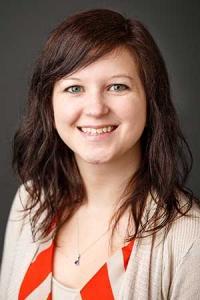
March is Brain Injury Awareness Month: Dr. Rayna Hirst Makes a Difference with PAU’s Sport Concussion Study

by Rayna Hirst, PhD, PAU Associate Professor, Director of the PAU Neuropsychology Program
For several years, graduate students working in my lab, the Behavioral Research and Assessment in Neuropsychology (BRAIN) Lab, have conducted a Sport Concussion Study in which we’ve gathered data to help families and sports organizations assess when it is safe for student-athletes to return to play after a concussion.
It's important to remember that brain injuries can happen in any sport and this month, Brain Injury Awareness Month, is a great reminder. A 2020 study showed the most common sports for concussions were football, hockey, and soccer, but also occur in other sports. PAU’s Sport Concussion Study provides baseline testing for a full range of organized sports, including football, hockey, and soccer, but also gymnastics, cheerleading, basketball, and rugby.
Related to recovery time and the ability to safely return to play, another 2020 study suggests that just one concussion can take a high-school athlete up to 30 days to recover from, and even longer for roughly 10 percent of those athletes.
Additional concerns include the cognitive effects of repeat concussions, risks of chronic traumatic encephalopathy, and discrepancies in personal baseline versus average function. All these concerns keep the topic of return-to-play protocol highly prioritized in the minds of researchers, coaches, and parents.
About the Sport Concussion Study
PAU graduate students in the Sport Concussion Study have played a significant role in advancing effective concussion care and return-to-play protocols at no cost to parents or coaches. At sports medicine clinics, cognitive baseline evaluations can cost thousands of dollars, but the PAU Sport Concussion Study offers evaluations for free. Recruitment into the Sport Concussion Study, however, is currently on pause due to the pandemic, but we plan to resume as soon as possible.
The Sport Concussion Study benefits two groups:
- Student-Athletes: Giving personalized insights into a student-athlete’s “normal” function to accurately assess when it is safe to return to play after a concussion, as well as reduce further risks associated with subsequent concussions.
- PAU Graduate Students: Offering students in our PhD in Clinical Psychology program opportunities to deliver clinical care and contribute to the growing body of research in concussion management and treatment.
- Appearing dazed or confused
- Dizziness or clumsiness
- Experiencing nausea or vomiting (for an unexplained reason)
- Forgetting what happened prior and/or after the event
- Headache or pressure in the head
- Losing consciousness (even for a moment)
- Attention and processing speed
- Language
- Visual spatial skills
- Learning and memory
- Higher order complex processes
- Problem solving
- Set shifting (or task switching)
- Cognitive flexibility
- Clinical patient care, such as diagnosing and treating patients after traumatic brain injury or progressive cognitive conditions such as Alzheimer’s disease
- Forensic or legal consultation
- Academic research or neuropsychology education
- Pharmaceutical consultation
- Industrial design consultation
